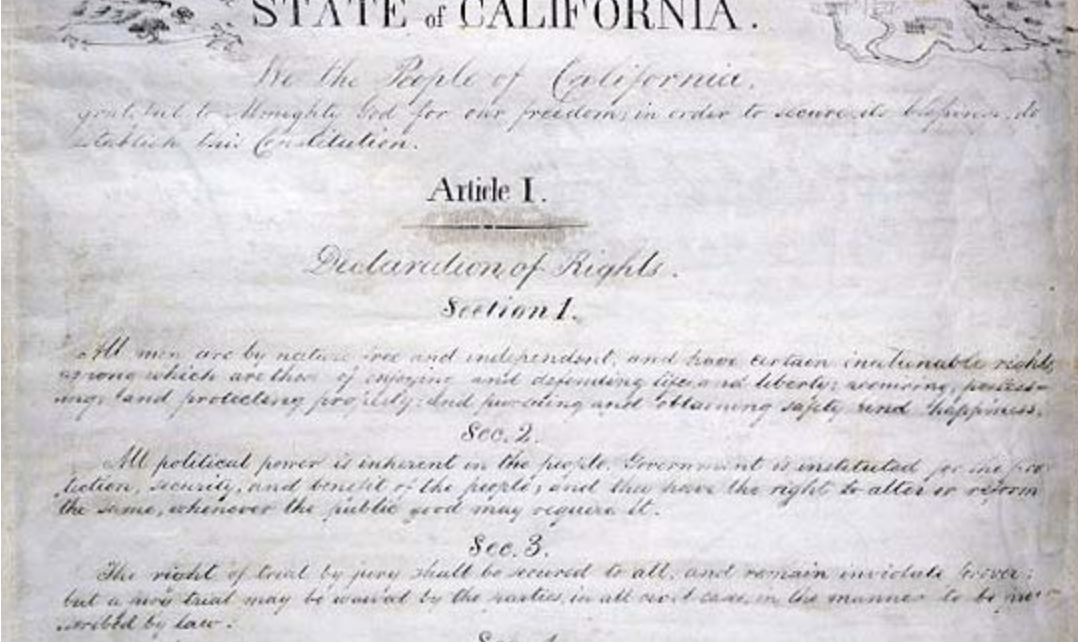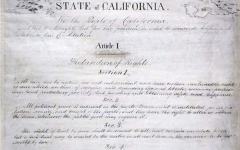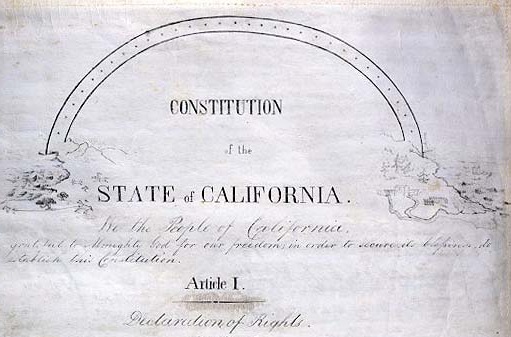
California Constitution. (Photo: www.sos.ca.gov)
Frequently Asked Questions about the California Constitution Article XIX
How much of the revenues can be pledged toward local bonds?
By Chris Micheli, May 26, 2024 2:30 am
How many sections does Article 19 have? This article contains ten sections.
What does Article 19 relate to? It relates to motor vehicle revenues.
Is there a prohibition on the use of motor vehicle revenues in this state? Section 1 prohibits the Legislature from borrowing revenue from the Highway Users Tax Account, or its successor, and they cannot use these revenues for purposes other than those specifically permitted by this article.
How are motor vehicle revenues distributed? Section 2 specifies that revenues from taxes imposed by the State on motor vehicle fuels for use in motor vehicles upon public streets and highways, over and above the costs of collection and any refunds authorized by law, must be deposited into the Highway Users Tax Account, which is a trust fund, and will be allocated monthly in accordance with Section 4. The revenues must be used only for specified purposes.
How are vehicle fees and taxes distributed? Section 3 provides that revenues from fees and taxes imposed by the State upon vehicles must be used for the specified purposes.
Do prior allocation formulas still apply? Section 4 specifies that the statutory formulas in effect on June 30, 2009, which allocate the revenues described in Section 2 to cities, counties, and areas of the State, remain in effect.
What is the Legislature prohibited from doing? Section 4 prohibits the Legislature from taking any action which permanently or temporarily does any of the following: (1) changes the status of the Highway Users Tax Account as a trust fund; (2) borrows, diverts, or appropriates these revenues for purposes other than those described; or (3) delays, defers, suspends, or otherwise interrupts the payment, allocation, distribution, disbursal, or transfer of revenues from taxes described in Section 2.
Can revenues be used to repay bonds? Section 5 authorizes the Legislature to use the revenues approved for allocation or expenditure under this section to be pledged or used for the payment of principal and interest on voter-approved bonds issued for the specified purposes.
How much of the revenues can be pledged toward state bonds? Section 6 provides that up to 25% of the revenues allocated to the State pursuant to Section 4 for the purposes specified may be pledged or used by the State, upon approval by the voters and appropriation by the Legislature, for the payment of principal and interest on voter-approved bonds for those purposes issued by the State November 2, 2010.
How much of the revenues can be pledged toward local bonds? Section 6 specifies that up to 25% of the revenues allocated to any city or county pursuant to Section 4 for the purposes specified in Section 2 of this article may be pledged or used only by any city or county for the payment of principal and interest on voter-approved bonds issued by that city or county for such purposes.
What happens if the Legislature changes the taxes? Section 7 states that, if the Legislature reduces or repeals the taxes described in Section 2 and adopts an alternative source of revenue to replace the moneys derived from those taxes, the replacement revenue is required to be deposited into the Highway Users Tax Account, dedicated to the purposes listed in Section 2, and allocated to cities, counties, and areas of the State pursuant to Section 4.
Are there any exclusions from this article? Section 8 provides that this article does not affect or apply to fees or taxes imposed pursuant to the Sales and Use Tax Law or the Vehicle License Fee Law.
What happens when real property is no longer needed? Section 9 provides that any real property acquired by the expenditure of the designated tax revenues by an entity other than the State for the purposes authorized in those sections, but no longer required for those purposes, may be used for local public park and recreational purposes.
What happens with surplus state property? Section 10 specifies that the Legislature, by statute, with respect to surplus state property acquired by the expenditure of tax revenues and located in the coastal zone, may authorize the transfer of the property to specified state departments for specified uses.




One thought on “Frequently Asked Questions about the California Constitution Article XIX”